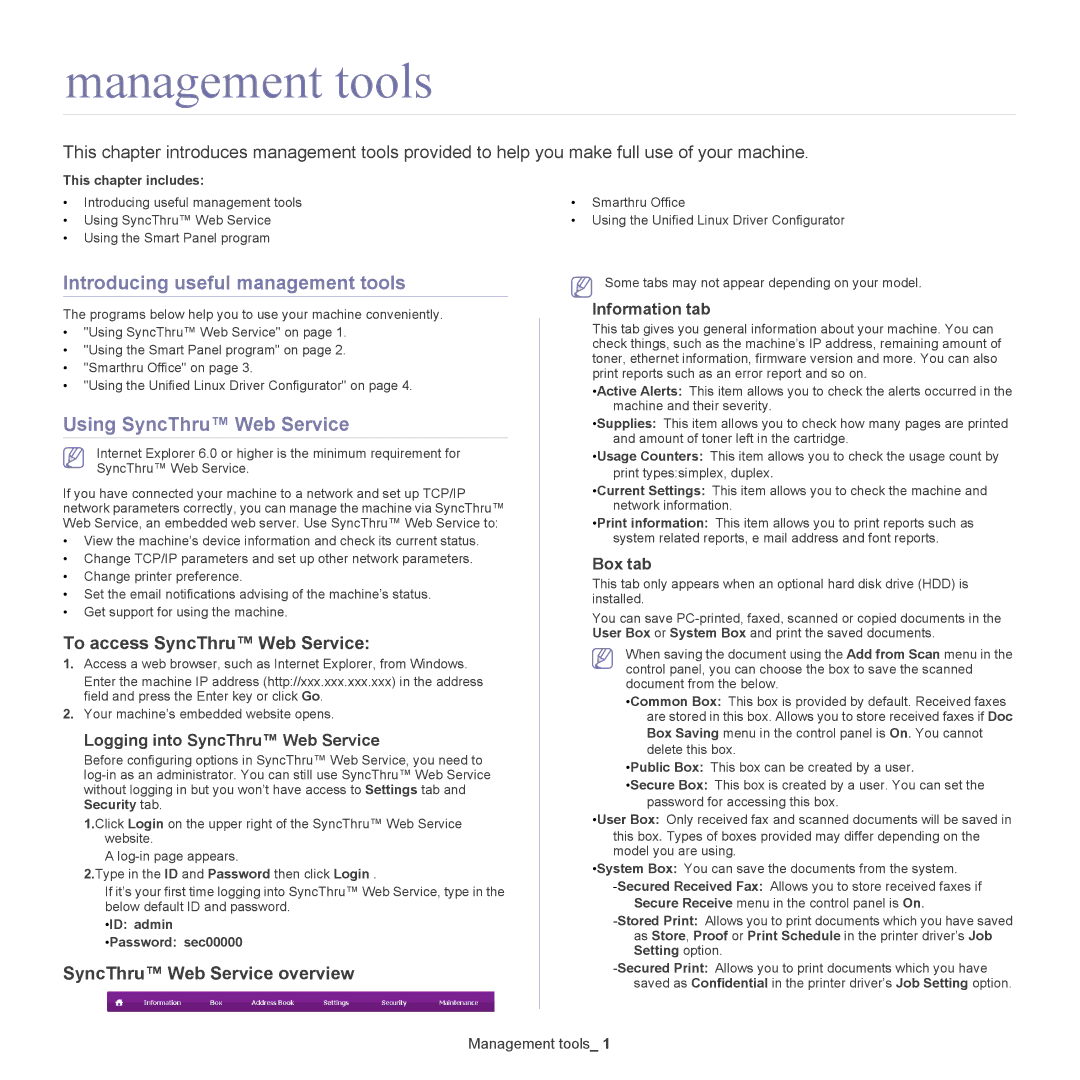
management tools
This chapter introduces management tools provided to help you make full use of your machine.
This chapter includes:
•Introducing useful management tools
•Using SyncThru™ Web Service
•Using the Smart Panel program
Introducing useful management tools
The programs below help you to use your machine conveniently.
•"Using SyncThru™ Web Service" on page 1.
•"Using the Smart Panel program" on page 2.
•"Smarthru Office" on page 3.
•"Using the Unified Linux Driver Configurator" on page 4.
Using SyncThru™ Web Service
Internet Explorer 6.0 or higher is the minimum requirement for SyncThru™ Web Service.
If you have connected your machine to a network and set up TCP/IP network parameters correctly, you can manage the machine via SyncThru™ Web Service, an embedded web server. Use SyncThru™ Web Service to:
•View the machine’s device information and check its current status.
•Change TCP/IP parameters and set up other network parameters.
•Change printer preference.
•Set the email notifications advising of the machine’s status.
•Get support for using the machine.
To access SyncThru™ Web Service:
1.Access a web browser, such as Internet Explorer, from Windows.
Enter the machine IP address (http://xxx.xxx.xxx.xxx) in the address field and press the Enter key or click Go.
2.Your machine’s embedded website opens.
Logging into SyncThru™ Web Service
Before configuring options in SyncThru™ Web Service, you need to
1.Click Login on the upper right of the SyncThru™ Web Service website.
A
2.Type in the ID and Password then click Login .
If it’s your first time logging into SyncThru™ Web Service, type in the below default ID and password.
•ID: admin
•Password: sec00000
SyncThru™ Web Service overview
•Smarthru Office
•Using the Unified Linux Driver Configurator
Some tabs may not appear depending on your model.
Information tab
This tab gives you general information about your machine. You can check things, such as the machine’s IP address, remaining amount of toner, ethernet information, firmware version and more. You can also print reports such as an error report and so on.
•Active Alerts: This item allows you to check the alerts occurred in the machine and their severity.
•Supplies: This item allows you to check how many pages are printed and amount of toner left in the cartridge.
•Usage Counters: This item allows you to check the usage count by print types:simplex, duplex.
•Current Settings: This item allows you to check the machine and network information.
•Print information: This item allows you to print reports such as system related reports, e mail address and font reports.
Box tab
This tab only appears when an optional hard disk drive (HDD) is installed.
You can save
When saving the document using the Add from Scan menu in the control panel, you can choose the box to save the scanned document from the below.
•Common Box: This box is provided by default. Received faxes are stored in this box. Allows you to store received faxes if Doc Box Saving menu in the control panel is On. You cannot delete this box.
•Public Box: This box can be created by a user.
•Secure Box: This box is created by a user. You can set the password for accessing this box.
•User Box: Only received fax and scanned documents will be saved in this box. Types of boxes provided may differ depending on the model you are using.
•System Box: You can save the documents from the system.
Secure Receive menu in the control panel is On.
as Store, Proof or Print Schedule in the printer driver’s Job Setting option.
Management tools_ 1
